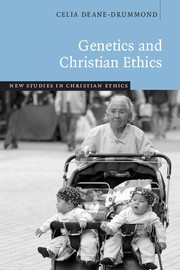Book contents
- Frontmatter
- Contents
- General Editor's preface
- Acknowledgments
- Introduction
- 1 A recovery of virtue for the ethics of genetics
- 2 Theological principles
- 3 Living in the shadow of eugenics
- 4 Genetic testing and screening
- 5 Genetic counselling
- 6 Gene therapies
- 7 Gene patenting
- 8 Women and genetic technologies
- 9 Genetics and environmental concern
- Postscript: Concluding remarks
- Bibliography
- Index
General Editor's preface
Published online by Cambridge University Press: 05 June 2012
- Frontmatter
- Contents
- General Editor's preface
- Acknowledgments
- Introduction
- 1 A recovery of virtue for the ethics of genetics
- 2 Theological principles
- 3 Living in the shadow of eugenics
- 4 Genetic testing and screening
- 5 Genetic counselling
- 6 Gene therapies
- 7 Gene patenting
- 8 Women and genetic technologies
- 9 Genetics and environmental concern
- Postscript: Concluding remarks
- Bibliography
- Index
Summary
This book is the twenty-fourth in the series New Studies in Christian Ethics. There are many points of mutual concern between this monograph and others within the series. Like Kieran Cronin's Rights and Christian Ethics, Michael Northcott's The Environment and Christian Ethics, Stanley Rudman's Concepts of Person and Christian Ethics and Susan Parsons' Feminism and Christian Ethics, it provides an expert critical overview of a complex area of secular discussion from a well-informed theological perspective. It also makes creative use of another monograph in the series, Stephen Clark's challenging Biology and Christian Ethics.
Celia Deane-Drummond's Genetics and Christian Ethics is well written, up to date and well informed. It covers a very full range of genetic issues and shows expert knowledge of both British and US developments. Using her own scientific background in this area, she provides detailed discussions of genetic testing and screening, genetic counselling, gene therapies, gene patenting and genetics and the environment. In each of these sub-areas changes are rapid and complex. Doubtless, particular scientific and technological developments will happen in each over the next few years. As she herself shows, the whole area of gene therapies, for example, has changed dramatically over the last decade, with scientists now being considerably more cautious than they were earlier. However, in each of these sub-areas she identifies ethical issues that are likely to abide whatever new developments take place.
- Type
- Chapter
- Information
- Genetics and Christian Ethics , pp. xi - xiiPublisher: Cambridge University PressPrint publication year: 2005

